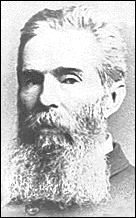
When Herman Melville died in 1891, the Springfield, Massachusetts, Republican wrote, "... it is probable that no work of imagination more powerful and often poetic has been written by an American than Melville's romance of Moby Dick; or the Whale, published just 40 years ago...." Certainly it is as the author of that classic novel that Melville is best known today. Yet, as the obituary went on to point out, Melville (who "retired" as a novelist before the War Between the States began) also turned his literary skills to poetry. His subject matter of choice was the events of the War. Most of these pieces were published (to scant public notice) in Battle-Pieces and Aspects of the War: Civil War Poems in 1866. Fewer than 500 copies of the volume were sold. Readers anxious to put the events of the War behind them objected to Melville's insistence on keeping the wounds fresh; others found the style of the pieces ponderous and unpalatable.
Twenty-five years after the collection's publication, however, the Republican would write, "Mr. Melville has not gained a place as poet, yet no one can read his book of Battle Pieces without much admiration for the vigor of the verse, and the frequent flashes of prophetic fire which they show.... The book is exceptional in that its verse was not suggested and put forth at the time of the events it wraps in rhythmic guise, but after the fall of Richmond Melville wrote nearly all of the poems; they show, nevertheless, such differences of proportion as might have occurred from the spontaneity of immediate impulse."
As Lee Rust Brown puts it in his introduction to the 1995 Da Capo Press edition of Battle-Pieces and Aspects of the War, "For Battle-Pieces to find the reception it deserves, as Melville's once forgotten fiction already has, we must open oursleves to a darker image of our Civil War than the images we are used to, and one that only the strongest literary imagination can make us see."